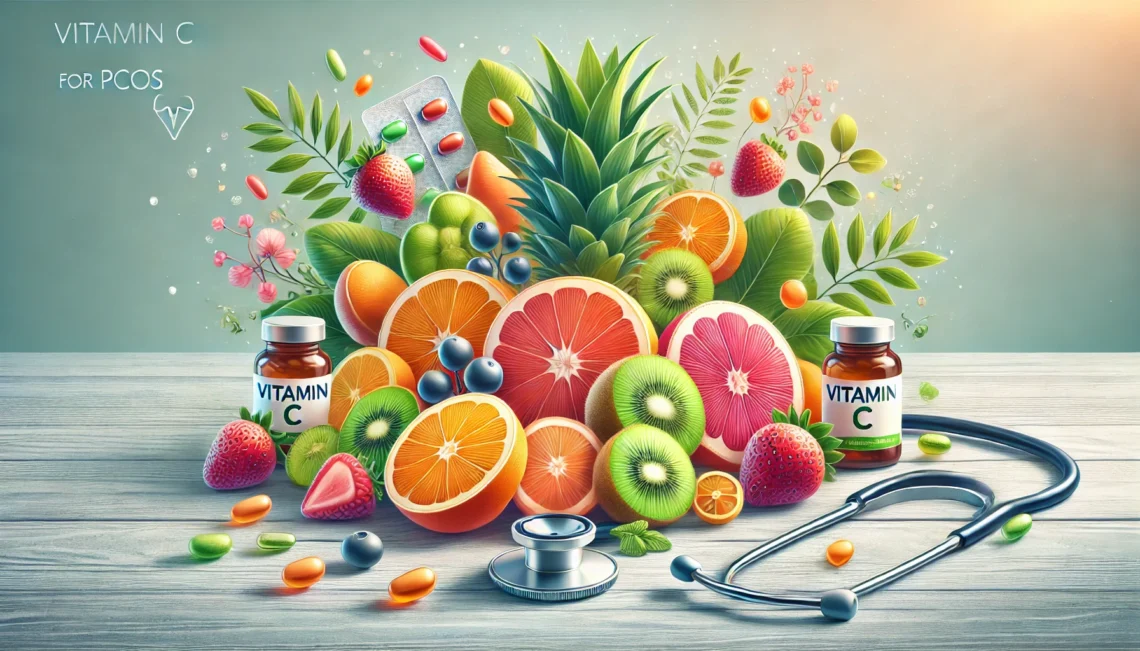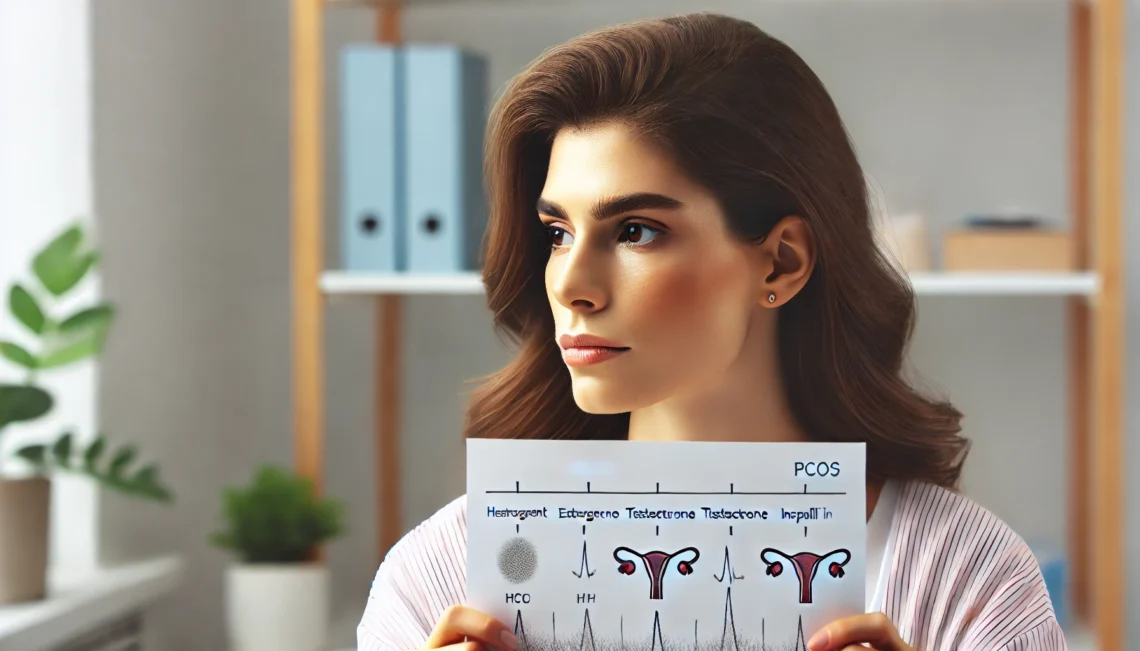Polycystic Ovary Syndrome (PCOS) is a prevalent hormonal disorder affecting women worldwide, often leading to a range of symptoms, including irregular periods, fertility challenges, acne, and excessive hair growth. While the condition is complex and multifactorial, recent studies suggest that Vitamin C may offer significant benefits in managing PCOS. This article explores how Vitamin C can support hormonal balance, improve fertility, and reduce inflammation in women with PCOS. What is PCOS and How Can Vitamin C Help? PCOS affects up to 1 in 10 women of reproductive age, causing imbalances in hormones such as insulin and androgens. The most common…
-
-
Polycystic Ovary Syndrome (PCOS) affects millions of women worldwide, often leading to hormonal imbalances, inflammation, and nutrient deficiencies—all of which contribute to hair loss. Learn more about the causes and symptoms of PCOS hair loss here. For many, supplements offer a promising solution to strengthen hair, prevent shedding, and address the root causes of PCOS-related hair loss. But do they really work? In this article, we’ll explore the most effective supplements for PCOS hair loss, how they work, and what you should consider before adding them to your routine. How PCOS Causes Hair Loss Hair loss in PCOS, or androgenic…
-
Polycystic Ovary Syndrome (PCOS) is a hormonal disorder that affects various aspects of a woman’s health, including her hair. One of the most common yet frustrating symptoms of PCOS is hair loss, often referred to as androgenic alopecia. This type of hair loss is caused by hormonal imbalances unique to PCOS. In this article, we’ll explore the role of hormones in PCOS hair loss, the science behind it, and strategies to restore balance and protect your hair. Understanding Hormonal Imbalances in PCOS PCOS is characterized by an overproduction of androgens (male hormones like testosterone) and imbalances in other hormones such…
-
Polycystic Ovary Syndrome (PCOS) affects millions of women worldwide, bringing with it a range of symptoms that can impact daily life. One of the most distressing side effects is hair loss. For women dealing with PCOS, hair thinning, bald patches, and receding hairlines can be emotionally challenging. In this article, we’ll delve into the causes of PCOS hair loss, the symptoms to watch for, and what you can do to manage it. What Causes PCOS Hair Loss? PCOS hair loss, also known as androgenic alopecia, is primarily caused by hormonal imbalances. Women with PCOS often have higher levels of androgens…
-
Polycystic Ovary Syndrome (PCOS) affects not only hormonal balance but also the health of your hair. Many women with PCOS struggle with hair thinning or loss due to hormonal imbalances, inflammation, and nutrient deficiencies. While diet and lifestyle changes play a vital role in managing PCOS symptoms, certain vitamins and minerals can help improve hair health and prevent further loss. This article explores the essential nutrients for PCOS hair loss and how to incorporate them into your routine. Why Nutrients Matter for PCOS Hair Loss Hair health depends on a steady supply of essential vitamins and minerals. In PCOS, hormonal…
-
Polycystic Ovary Syndrome (PCOS) affects not only hormonal balance and metabolism but also the health of your skin. Many women with PCOS experience acne, oily skin, dark patches (acanthosis nigricans), and other dermatological issues due to hormonal imbalances and inflammation. While skincare routines help manage symptoms, certain vitamins can improve skin health from within. In this article, we explore the best vitamins for skin health in PCOS, their benefits, and how to incorporate them into your routine. How PCOS Affects Skin Health PCOS-related skin issues arise from hormonal and metabolic factors, including: Excess Androgens: High levels of male hormones stimulate…
-
Polycystic Ovary Syndrome (PCOS) often causes weight gain and difficulty losing weight due to hormonal imbalances and insulin resistance. While a healthy diet and regular exercise are essential for weight management, vitamins and minerals can play a significant supporting role. This article explores the best vitamins and minerals for PCOS weight management, how they work, and how to incorporate them into your routine. How Vitamins and Minerals Support PCOS Weight Management Women with PCOS often face challenges like slower metabolism, increased hunger, and difficulty processing insulin. Certain vitamins and minerals can: Boost Metabolism: Some nutrients enhance your body’s ability to…
-
Polycystic Ovary Syndrome (PCOS) is a common hormonal condition that affects millions of women worldwide. While managing PCOS often involves medication and lifestyle changes, diet plays a crucial role in reducing symptoms and improving overall health. One of the best ways to support your body is by consuming foods rich in essential vitamins. This article explores five foods packed with vitamins that can help manage PCOS symptoms, enhance hormonal balance, and boost fertility. Why Vitamins Are Important for PCOS Women with PCOS often experience nutritional deficiencies due to hormonal imbalances, insulin resistance, and inflammation. Certain vitamins, such as Vitamin D,…
-
Polycystic Ovary Syndrome (PCOS) affects millions of women worldwide, often leading to hormonal imbalances, insulin resistance, and various other health issues. While diet and exercise are key to managing PCOS, many women turn to multivitamins to fill nutritional gaps and support overall health. But how effective are they? In this article, we’ll explore the benefits of multivitamins for women with PCOS, the nutrients to look for, and tips for choosing the right one. Why Multivitamins Matter for Women with PCOS PCOS often brings unique nutritional challenges. Many women with this condition experience: Deficiencies in essential vitamins and minerals like Vitamin…
-
Vitamin C, a powerful antioxidant, plays a crucial role in reproductive health and can be a game-changer for women with Polycystic Ovary Syndrome (PCOS). PCOS is often associated with hormonal imbalances, inflammation, and fertility challenges, all of which Vitamin C can help address. In this article, we’ll explore the benefits of Vitamin C for PCOS-related fertility, how to incorporate it into your diet, and the best ways to enhance its effects. Understanding Vitamin C Vitamin C, also known as ascorbic acid, is a water-soluble vitamin essential for various bodily functions. Known primarily for boosting the immune system, Vitamin C also:…


